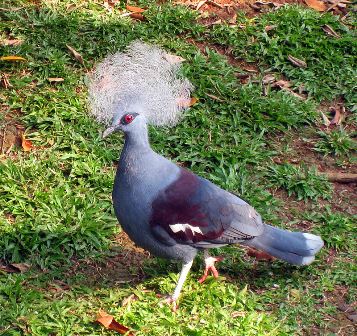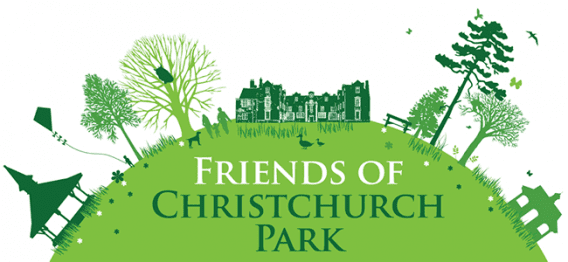The blue-crowned pigeon is the giant of the pigeon world, being 33 inches in length. It differs from normal pigeons by having 16 instead of 12 tail feathers, lacks an oil gland and has a large fan-shaped crest on its head. It feeds on the ground and, according to experts, is a rather stupid pigeon, usually perching in the open, therefore being more easily trapped or shot. Not only that, but it is also good to eat and is thus now becoming much rarer. Found in the jungles of New Guinea, it is nevertheless a beautiful bird, an asset to any zoo or bird collection.
This is the sad tale of a pigeon. On our council estate at Priory Heath just after World War II, there was a man, a Mr Baxter, a rather private man who kept exotic birds. He was a former worker at the London Zoo and therefore had access to the ‘leftovers’ or birds that the zoo no longer wanted. He had a well-constructed aviary in his back garden, and his tall hedges prevented the prying eyes of us, youngsters, from getting a good view of his exotic collection of birds. However, his next-door neighbour, Mr Bedford and his son Raymond, had gleefully told us about this wondrous collection, especially about the magnificent blue-coloured pigeons. Raymond said that this bird was huge, the size of a turkey. We boys desperately wanted to get a glimpse of this creature, but the secretive man never gave us an invitation, in fact, he would discourage us from looking even into his front garden, let alone his back garden which housed his aviary.

One morning in July, a notice was put up in his front garden stating that one of his magnificent pigeons had disappeared and that he was offering a reward of £2 for its return. £2 was a lot of money in those days. Oh, how we wished we could get our hands on that two pounds. Oh well, youngsters can only dream, especially youngsters from a Council Estate. Imagine our surprise when the local policeman, PC Jack Roper, arrived on the scene astride his enormous bicycle. He did not venture into the former zookeeper’s house, but instead began knocking on the doors of the houses opposite. He insisted that all of us youngsters from numbers 105 – 127 be paraded in the road (there must have been about 2 dozen of us) followed by questions as to which one of us had stolen the pigeon. This did not go down very well with our parents. My father was outraged and argued with our local policeman – and then threatened him with a hoe. My friend Tod’s dad weighed in too, waving a shovel, and soon the road was like a war zone of men in waistcoats and rolled up shirt sleeves shouting and waving various tools. It was not long before a fleet of Wolseley cars with flashing blue lights and clanging sirens, most likely summoned from the blue police ‘Tardis’ at the end of the road, came hurtling towards us. A line of blue-clad men formed a barrier between the ex-zookeeper’s house and the irate band of fathers.
No one took much notice of ‘Spudger’ Sparrow as he came around the corner from Cobham Road carrying in his arms a rather large blue bird. Silence descended and Spudger calmly announced that the exotic pigeon had been scrumping Mr White’s peas, and so he was easy to catch. The police seemed relieved, our fathers put down their weapons, and Mr Baxter smiled and took the bird off little Spudger. All was peaceful, the animosity is forgotten until Spudger asked for the £2 reward money, thinking only of how it would fund his sweet supply for a month. ‘You don’t get a reward,’ snarled Mr Baxter. ‘Why not?’ asked his father. ‘Because he probably stole my pigeon in the first place,’ was the reply. Spudger’s dad raised his shovel and almost brought it down onto Mr Baxter’s arm. At that point, all bedlam was let loose. Bill Sharman’s Dad shouted that it was Priory Heath versus Ipswich Borough Police and then Tod’s mum, with ‘pinny’ round her waist, poked PC Roper in his midriff with her rolling pin. Whistles were blown, expletives filled the air, and then another police car delivered the Chief Constable to Lindbergh Road. It took several minutes to calm the situation. The Chief Constable, a man with a silver braid and a slight stutter, after a huddled discussion with Mr Baxter, suggested that Spudger should be presented with a half-crown as a reward. Unsurprisingly, this did not go down well with much muttering and threats of revenge, but slowly we then dispersed. My mum made a suet pudding and my Dad ate his lunch whilst mumbling about the law being only on the side of the rich and ex-zoo-keepers.
For two days, there was a truce. Although PC Roper had reinforcements when he patrolled our estate, three days later police cars arrived at Mr Baxter’s house and their occupants began knocking on the doors of 105 to 127. Someone had broken into Mr Baxter’s aviary and all four of his prized blue pigeons had been stolen. It was known that they could not have gone far, as they are incapable of long flights. Enquiries went on for weeks, but the pigeons were never seen again, Mr Baxter became even more reclusive, my Dad settled down to weed his strawberry patch and Tod’s mum sang as she mangled her washing outside her back door. I am told that blue crowned pigeons from New Guinea are delicious with roast potatoes and garden peas.
When we were ten and three-quarter years old, the Priory Heath Junior Natural History Society came to a shuddering halt. We sat our exams to find out who would go where after junior school. Derek, Lofty and I went one way, Harry, Billy, Tod and Spudger went another. Brains, however, passed the entrance exam for a rather exclusive school in Ipswich. My much older brother, who had also attended my new school before me, paid for everything that I needed which had to be in grey, red, black and white – the list seemed endless. Without his financial help, I think I would have had to further my education elsewhere. As for Brains, I have no idea who sponsored him, but someone had seen something special in this lad. In later life, we discussed our school days and Brains recalled his first English lesson. The boys had been asked to write an essay on what their father did for his living. Times are more sensitive today and it probably would not happen because of the embarrassment it can cause. It seems that most described occupations such as doctors, solicitors, bankers and the like. Brains said that he wrote more than most of them describing how his father worked for the local Co-op and that every day he would load up his coal cart with 1 cwt sacks of coal, hitch up his horse and spend the whole day tipping coal into the neighbourhood coal-houses. When brains’ father arrived home after a day’s work black with coal dust and with eyes red and sore, he would have a strip wash in the backyard using water from the water butt, whatever the time of year. Brains’ English master took him to one side and suggested that the essay should remain a secret between the two of them.
Later we were all ‘called up’ for National Service. I was seconded into the Grenadiers, Brains became a Captain in – well he never disclosed what it was but it was something secret. When we met we also discussed the PHJNHS and spoke fondly of Mr Baker. Times have changed so much. The freedom of the countryside we enjoyed is no longer available to youngsters now. Sadly all those wonderful things that we experienced have disappeared but we have our memories.
Reg Snook
PS – This is the third and final “Jottings” on the PHJNHS.
